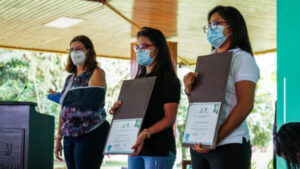 The winning project, created by Juana Suar Domínguez, Mónica Alejandra Montoya Grajales and Francely Concepción Flores, consists of solid biofuel bricks as a firewood substitute, for use in the community of Río Blanco, San Marcos, Guatemala.
The winning project, created by Juana Suar Domínguez, Mónica Alejandra Montoya Grajales and Francely Concepción Flores, consists of solid biofuel bricks as a firewood substitute, for use in the community of Río Blanco, San Marcos, Guatemala.
Biofuel bricks are made from paper and cardboard waste. These bricks can replace firewood, which is traditionally used for heating and cooking food, among other activities. Traditional firewood releases dangerous gases into the atmosphere, requires cutting down trees, and has consequences for human health, as breathing in the harmful substances released during combustion can cause respiratory illness.
After careful research of the Río Blanco community’s waste management system, the team found that there were many repurposable materials being improperly discarded. They conceptualized biofuel bricks as a solution that could solve this problem, by upcycling specific wastes into a safer, healthier, environmentally- and economically- friendly, alternative source of fuel.
To fabricate the bricks, the help of the community was necessary. Community members were educated and trained on waste management skills. Then, the trained community members gathered materials to be transported to convenient collection areas to be properly sorted. Once the materials were gathered and sorted, a specifically made hydraulic jack machine was built. The hydraulic jack was filled with a mixture of the target waste products, creating bricks using molds of a variety of shapes.
Comparison tests of combustion filters were performed to find the most efficient brick. Both traditional firewood and LlamaBrick briquettes were burned in biofuel stoves. Then, combustion filters from each stove were analyzed, and the filter used to capture exhaust from the LlamaBrick-burning stove yielded superior results to that of the traditional, firewood-burning stove.
LlamaBrick briquettes are affordably priced, easily accessible, community produced goods. They contribute to improved health outcomes in the community, through a decreased threat of respiratory diseases. They also provide environmental benefits in the form of reduced community contribution to deforestation, as well as any transportation-related carbon emissions associated with bringing firewood into the community. Ultimately, both the environment and the wellbeing of the community benefit from the reuse and repurposing of community waste into a product that demands fewer raw, natural resources, and releases less harmful gas into the atmosphere.
For more information, please see this interview with Juana, Mónica and Francely.
“For me, the LlamaBrick project is my way of contributing to the development of communities. But it’s also important for the people to be able to supply themselves with firewood for daily consumption. The project provides an alternative for women and children (who are usually in charge of obtaining firewood) to manage a lightweight and easily accessible input.”
JUANA SUAR DOMÍNGUEZ, SUSTAINABILITY PRIZEWINNER, 2020
“This project is an opportunity for rural communities to obtain better living conditions with a product that is environmentally friendly with features that favor easy burning, which promotes awareness of environmental problems and brings with it a solution that benefits the community.”
MÓNICA ALEJANDRA MONTOYA GRAJALES, SUSTAINABILITY PRIZEWINNER, 2020
“For me, the LlamaBrick project is very important since I see an opportunity to improve the quality of life for Guatemalan and Latin American families, as well as having that added value in the environmental field to be an alternative energy resource that is environmentally friendly.”
FRANCELY CONCEPCIÓN FLORES, SUSTAINABILITY PRIZEWINNER, 2020



Juana Suar Domínguez, Mónica Alejandra Montoya, and Francely Concepción Flores recently established the LlamaBrick initiative by providing training and education to local community members and creating a waste center for the collection, repurposing and monetization of solid waste products in Guatemala’s rural areas. The group’s efforts have improved the quality of life for rural Guatemalan communities and opened up communications channels between local municipal representatives and the communities they serve, for future development possibilities.
“Educational and Productive Model for Ancestral Agriculture in Peri-urban Space”
 The second-place project, Educational and Productive Model for Ancestral Agriculture in Peri-urban Space (or MEPPA, as in its acronym in Spanish), created by Dasha Montcalm Alvarez and José Andrés Charpentier Jiménez, consists of a replicable model for agriculture aimed at contributing to food and economic security for the Costa Rican population.
The second-place project, Educational and Productive Model for Ancestral Agriculture in Peri-urban Space (or MEPPA, as in its acronym in Spanish), created by Dasha Montcalm Alvarez and José Andrés Charpentier Jiménez, consists of a replicable model for agriculture aimed at contributing to food and economic security for the Costa Rican population.
MEPPA provides a connection to nature for urban dwellers by educating farmers in sustainable, traditional, and restorative agricultural practices. It does this through the use of ancient and Indigenous approaches to agriculture, including seed preservation; the use of ancient planting formulations, such as mandalas; composting; and other nondestructive farming practices. It is also designed for farmers to then provide goods and services to the local economy, while restoring the health of the environment.
While at EARTH, the team engaged in the development of a prototype MEPPA system at a school in Heredia, Costa Rica. Although this work was interrupted by the COVID-19 pandemic, the team used this opportunity to develop their project virtually, by creating and launching an associated website, Agrosimbiosis.org. The website was designed to connect small farmers and allow them to share their knowledge quickly and effectively, and proved to be an important feature, as COVID-19 has strengthened farmers’ dependence on virtual information sharing.
MEPPA emphasizes organic and sustainable agricultural management methodologies that give agency to individuals, by enabling small farmers to self-produce needed resources. This alleviates the demand for monocultural and agrichemical methods of food production. It also supports small producers and businesses, creating a more resilient network that utilizes a rich variety of methods and tools that can be shared and easily replicated.
The project was legally incorporated into a company in Costa Rica in the spring of 2021, under what is now called Agrosimbiosis. Legal planning is underway to consolidate within Costa Rica, and the duo is currently constructing a physical complex of the MEPPA project as a learning and replication model so that it can be shared with as many people as possible. For more information, please see this interview with Dasha and José Andres.
“I have an exceptional calling to devote my time, efforts, knowledge and love to the environment, agriculture, learning, work and people. It is because of this that I focus on community development, sustainable agriculture (good agricultural practices and organic agriculture) and the creation of alternatives to live in a more efficient and conscientious way with the environment. MEPPA is a life project that I will continue working together with José on in order to improve the environment around me, as well as progress on a personal and professional level.”
DASHA MONTCALM ALVAREZ, SUSTAINABILITY PRIZEWINNER, 2020
“In the future I see myself working on this project. I hope to maintain a source of connection between different people related to agriculture, in order to support the mobilization of products and knowledge. I also hope that the platform bridges information and tools for agro-ecology, work and community development. I know that this project will serve to reconnect the close relationship that exists between humans and the ecosystem on a physical and spiritual level.”
JOSÉ ANDRÉS CHARPENTIER JIMÉNEZ, SUSTAINABILITY PRIZEWINNER, 2020
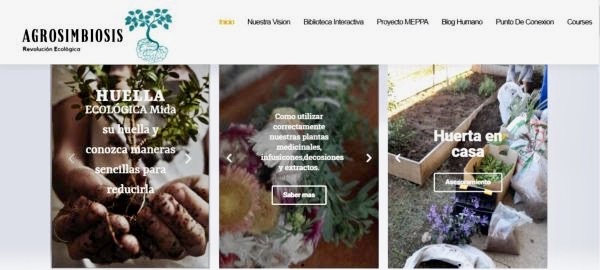


Dasha Montcalm Alvarez and José Andrés Charpentier Jiménez recently bought a farm in San Antonio de Belén, Heredia, Costa Rica, which is already garnering interest and support from local neighbors and students. With the financial support of The Lab’s Sustainability Prize at EARTH University, as well as the help of an investor, the duo has the tools to take their project even further. They have already built two mandala gardens, focusing on medicinal plants and vegetables, and plan to build two greenhouse domes, where they can experiment with the role of light and humidity to produce different growing environments for the production of various crops. Dasha and José are excited about how MEPPA continues to evolve as they both grow professionally.
 The winning project, created by Yesenia Sandra Cahuana Condori, consists of a water purification system using biofilters.
The winning project, created by Yesenia Sandra Cahuana Condori, consists of a water purification system using biofilters.
Biofilters are devices that use various organic and biological materials to remove contaminants from water or air. In developing YAKU, prototype biofilters were created following an extensive physiochemical analysis to determine the appropriate raw materials, preparation time, and form. The biofilters developed for YAKU are ceramic devices containing waste materials such as animal bones, residues from rusty metals, and agricultural byproducts such as lignin fibers.
Following the determination of the appropriate specifications, the biofilters needed to be cooked at a high temperature. This prompted the construction of an artisanal, wood-fired oven in order to complete production. After being cooked, the filters were tested using water obtained from a river near EARTH University. Analyses were conducted to evaluate the water quality, testing for indicators including pH, phosphates, nitrates, chrome, arsenic, and others. According to the analyses, the water quality was found to be within the optimal values established by Costa Rican law. The cost of production per biofilter was determined to be about 32 USD. The results showed that the project is both viable and ready to be applied in rural communities.
Yesenia plans to scale up this initiative in a rural area near Arequipa, Peru, where she will initiate the construction of another oven in which to produce the biofilters, which will be sold at a low cost to local families. In her scale-up, she plans to employ local women, particularly single mothers, who will be involved in the production and sale of the biofilters. She then plans to patent the project and begin production at a large scale, with the ambition to eventually expand throughout Peru and Latin America.
YAKU addresses multiple needs simultaneously. It provides a means for families in rural communities to obtain low-cost access to safe drinking water, mitigating the health risks associated with waterborne illnesses. It creates economic opportunities for women, providing a dignified and flexible source of work that will increase household income while enabling mothers to spend more time with their children. Furthermore, its utilization of waste materials from various agricultural and industrial sources showcases a waste-to-resources approach.
For more information, please see this interview with Yesenia.
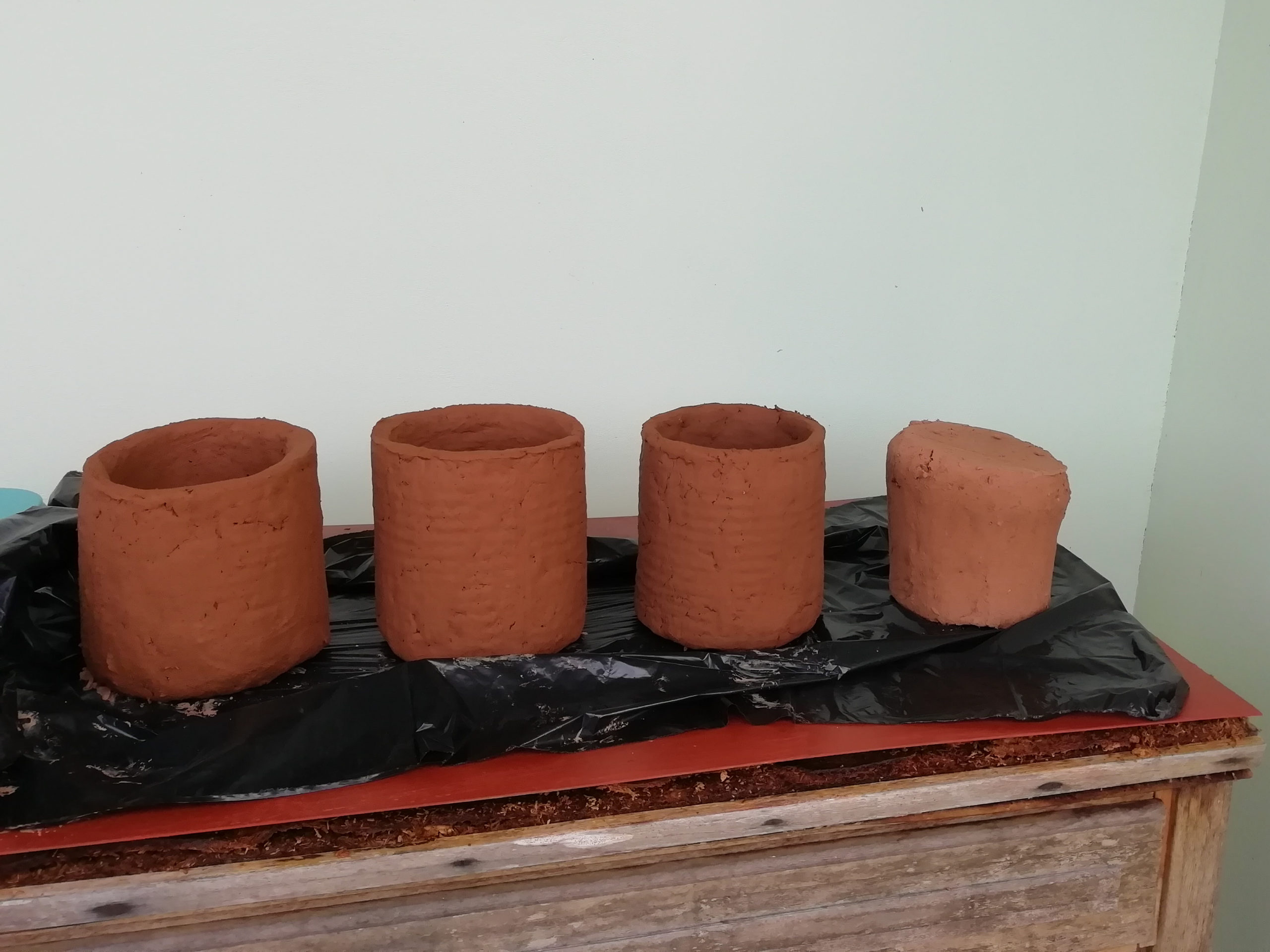

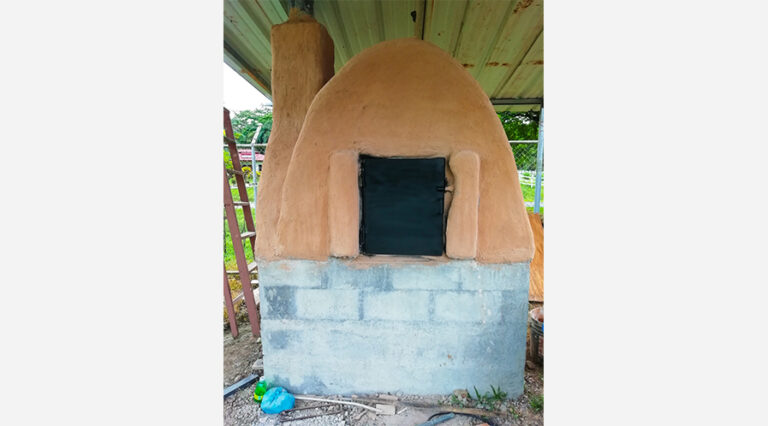
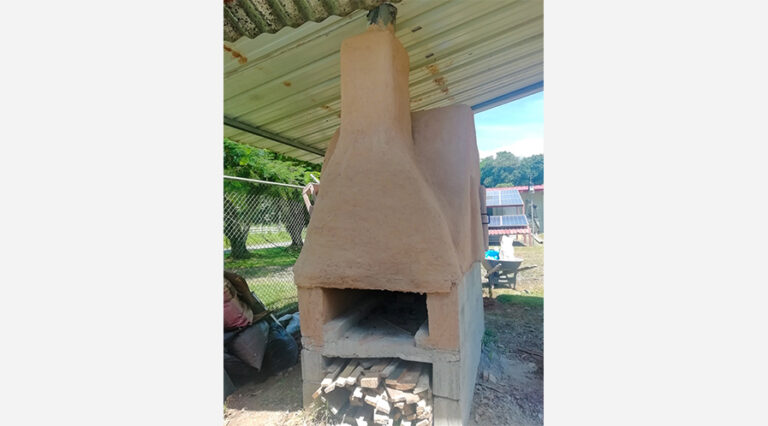
“YAKU is important because it will remove contaminants from water, meaning that people will be able to consume high-quality water. What makes biofilters different than other water purification techniques is that they remove heavy metals from water, such as arsenic, lead, and chromium.”
YESENIA SANDRA CAHUANA CONDORI, SUSTAINABILITY PRIZEWINNER, 2019
Yesenia has presented YAKU at numerous international conferences, including the World Student Environment Network Latin American Regional Summit in 2018, at the National Autonomous University of Mexico (UNAM), as well as at Nosotras Innovamos (“We [Women] Innovate”) in 2019 at the UNESCO Regional Chair – Women, Science, and Technology in Latin America, in Barcelona, Spain. In the near future, she plans to immerse herself in the scale-up of the project, with plans to ultimately bring production to national and international levels.
Please enjoy this short video from the 2019 Sustainability Prize ceremony at EARTH University!
 The winning project, created by the team of Da Cruz Albertazzi and Loubert, consists of an agrosilvopastoral system, which combines agriculture, forestry, and the pasturage of animals.
The winning project, created by the team of Da Cruz Albertazzi and Loubert, consists of an agrosilvopastoral system, which combines agriculture, forestry, and the pasturage of animals.
The team implemented a pilot project on a plot of land in eastern Costa Rica, using free range, egg-laying hens. They sought to determine the efficiency of egg production based on three different diets, with the aim of reducing the amount of concentrated feed by complementing the diets with pasturage. They also sought to evaluate the effectiveness of poultry for weed control, and compare the soil nutrient content with and without the use of poultry.
The analysis of three different diets for the hens, using varying amounts of concentrated feed, pasturage, and the plant Alocasia macrorrhiza, showed that the addition of the plant and pasturage allowed for significant reductions in the use of feed, resulting in an economically viable alternative to a diet of 100% concentrate. It was also determined that poultry under pasturage effectively controls weeds, which reduces the need for labor for weed control. Tests of the soil nutrient content found an incremental increase in the nutrient content of the soils under pasturage; however, these results are subject to longer-term study. Additionally, due to egg generation at the pilot project, the team was able to develop the “Happy Eggs” brand, and the sales of these eggs contributed to the development of the project.
The team plans to scale up this effort on a plot of land in Bajos del Toro, located in central Costa Rica. The proposed plot consists of 2 hectares of land for pasturage and half of a hectare of prime forest. They plan to begin with the agro-forestry component of their project, and when the plants have reached a suitable size, to introduce egg-laying hens for pasturage. Da Cruz Albertazzi and Loubert view this particular region as advantageous due to its popularity for ecotourism, and plan to introduce an agro-ecotouristic component to the scale-up that teaches tourists about the importance of growing food in harmony which the environment and the people who produce it. Furthermore, they anticipate their project serving as a model for other agricultural projects in the region, showcasing an approach to agriculture that benefits the environment, the local economy, and the surrounding community.
For more information, please see this interview with the prizewinners.

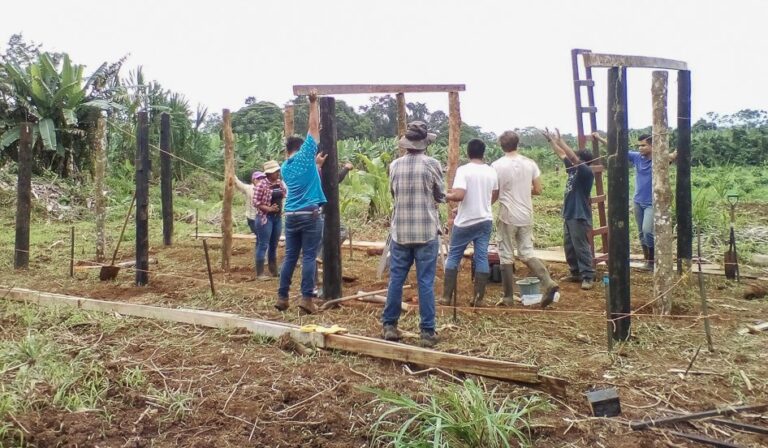



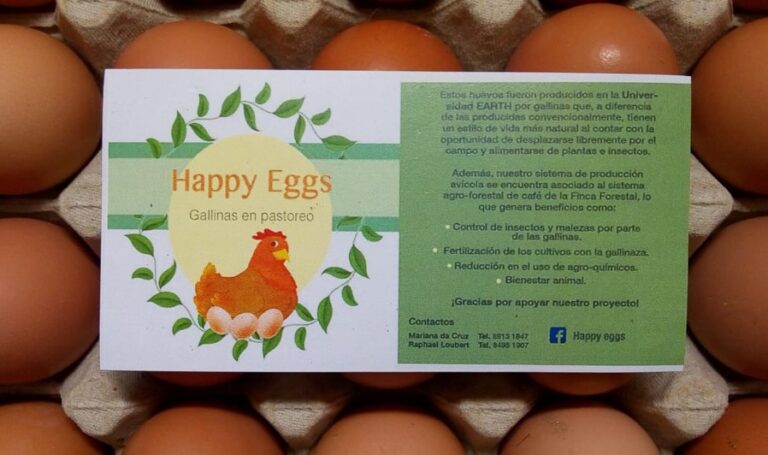
“This project is very important, because this system is replicable everywhere by small or big producers. It allows for reduced production costs through each component of the system: trees give shadow and create micro-climates for the crops. Some of the crops can feed the chickens, which create natural fertilizers and control pests, resulting in indirect income. Eggs and meat also result in direct income. The balance through this type of production has a positive impact on environment.”
RAPHAËL LOUBERT, EARTH UNIVERSITY PRIZEWINNER, 2018
Agrosilvopastoral systems can be implemented throughout the world, by accounting for adjustments in soil type and the climatic characteristics of each region. They represent “closed loop” systems that utilize the waste from one element in the production of other elements, which reduces the need for external inputs. Agrosilvopastoral systems are low-impact, environmentally friendly, generate opportunities among farmers and producers, and boost the local economy.
 Mariana and Raphaël plan to work together in the near future on various agro-ecological projects in the southern part of Costa Rica. They are both passionate about permaculture, and their plan is to gain experience and raise funds so that they can develop the scale-up of their agrosilvopastoral project with the lowest possible risk in Bajos del Toro. They hope to develop other, similar projects in other areas as well.
Mariana and Raphaël plan to work together in the near future on various agro-ecological projects in the southern part of Costa Rica. They are both passionate about permaculture, and their plan is to gain experience and raise funds so that they can develop the scale-up of their agrosilvopastoral project with the lowest possible risk in Bajos del Toro. They hope to develop other, similar projects in other areas as well.
 Inspired by an earthquake in 2016 in their native Ecuador that devastated costal areas and left residents without access to clean, freshwater, Jhoselyn and Kalem designed and constructed a small-scale, no-impact water desalination system incorporating condensation and gasification techniques. They call this system Yaku Thani, from the Quechua words for “healthy water.” The design relied on biomass-generated energy from coconut fiber combined with a desalination mechanism composed of an evaporator and condenser.
Inspired by an earthquake in 2016 in their native Ecuador that devastated costal areas and left residents without access to clean, freshwater, Jhoselyn and Kalem designed and constructed a small-scale, no-impact water desalination system incorporating condensation and gasification techniques. They call this system Yaku Thani, from the Quechua words for “healthy water.” The design relied on biomass-generated energy from coconut fiber combined with a desalination mechanism composed of an evaporator and condenser.
The desalination trials were performed using three types of coconut fibers: natural (complete husk), mid-sized chips, and small chips. The quality of water was obtained by analyzing the pH levels, sodium content, biochemical oxygen demand and chemical oxygen demand. The medium-sized chips were most efficient in the early trials, producing approximately a liter of desalinized water in just under an hour and a half. The team has already designed an upgraded desalinization system based off of their initial trial to improve quality and efficiency.
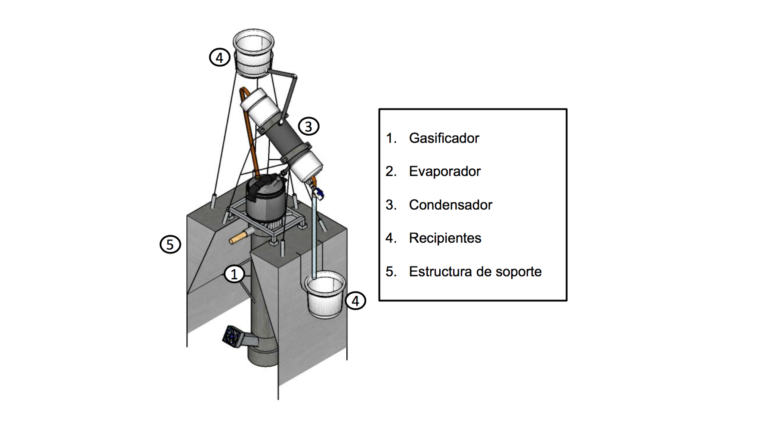


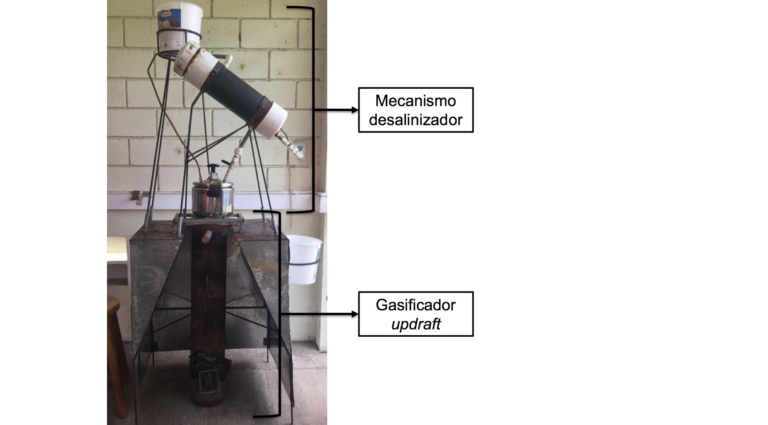


“The Yaku Thani’s aim is to solve the worldwide shortage of clean water that affects the quality of life of people around the world. This shortage is more severe in coastal areas, where even though water is abundant, its unfavorable condition limits its use and consumption.”
– JHOSELYN DAYHANA MENDOZA LOZANO, EARTH UNIVERSITY PRIZEWINNER, 2017
Intended for individual families, the resulting design is relatively cheap to construct and compact to store, boasting a replicable system for easy assembly and disassembly. Using the mid-sized chips, the system achieves 88% desalinization in just under an hour and a half.
 Jhoselyn Dayhana Mendoza Lozano hails from the Esmeraldas Province along the north coast of Ecuador. After graduation, Jhoselyn plans to work in a citrus company called Citrofrut, to obtain greater professional experience. In the long-term, she plans to work in community development, specifically at the intersection of sustainable agriculture and renewable energy, to raise the quality of life for people around the world.
Jhoselyn Dayhana Mendoza Lozano hails from the Esmeraldas Province along the north coast of Ecuador. After graduation, Jhoselyn plans to work in a citrus company called Citrofrut, to obtain greater professional experience. In the long-term, she plans to work in community development, specifically at the intersection of sustainable agriculture and renewable energy, to raise the quality of life for people around the world.
Kalem García Abad is from a small village called Zapotillo in the south of Ecuador. Her time at EARTH University inspired her to use her professional skills to impact the lives of local communities. As an agronomist, she plans to continue working to teach farmers sustainable agricultural practices.
“Farmers are so important to our lives because they feed and nourish us, but they need to know how they can save the land, too.”
– KALEM GARCÍA ABAD, EARTH UNIVERSITY PRIZEWINNER, 2017
Jhoselyn and Kalem plan to continue their work developing the Yaku Thani desalinization system.
This year, we also awarded a $2,500 prize to the runners up, Johanna Carmona and Carolina Aguilar, for their project Cultivarme, a marketing strategy for contract farmers in Limón, Costa Rica, providing economic support and financial leverage to farmers, ensuring fair trade, and providing consumers with access to fresh, local goods. For more information about this project, click here.
“Production and Marketing of Crafts Made of Fiber Banana Pseudostem in Rural Central America”
 For her project, Sindy identified a group of Ecuadoran artisans, the Association of Women Agro-artisans (AMA), working with banana pseudostems, a waste byproduct of the banana plantations that are common throughout the region. Sindy conceived of a pilot program to train rural women from Limón, Costa Rica to process the pseudostem fibers and turn them into high-quality crafts like hats, wallets, handbags, jewelry and more.
For her project, Sindy identified a group of Ecuadoran artisans, the Association of Women Agro-artisans (AMA), working with banana pseudostems, a waste byproduct of the banana plantations that are common throughout the region. Sindy conceived of a pilot program to train rural women from Limón, Costa Rica to process the pseudostem fibers and turn them into high-quality crafts like hats, wallets, handbags, jewelry and more.
In order to bring three Ecuadoran artisan women to train the Costa Rican group, Sindy raised $12,000 from the Grameen Association; the Mayor of Machala, Ecuador; members of the EARTH community, including rector José Zaglul; and The MasterCard Foundation. Thirty-five women took part in a five-day training program, culminating in an emotional recognition ceremony. This was followed by another training session for a group from Guácimo several months later.
Soon after, one of the trainees formed her own women’s group, training another seven women to create banana pseudostem crafts. As the women’s group, as well as their skill in working with the material, grew, they became a formal association. Handicrafts Kalöm was born, named for the local indigenous word for “banana.” Sindy and the women were able to create a reputable brand, and build relationships with local retailers to get the products in stores.

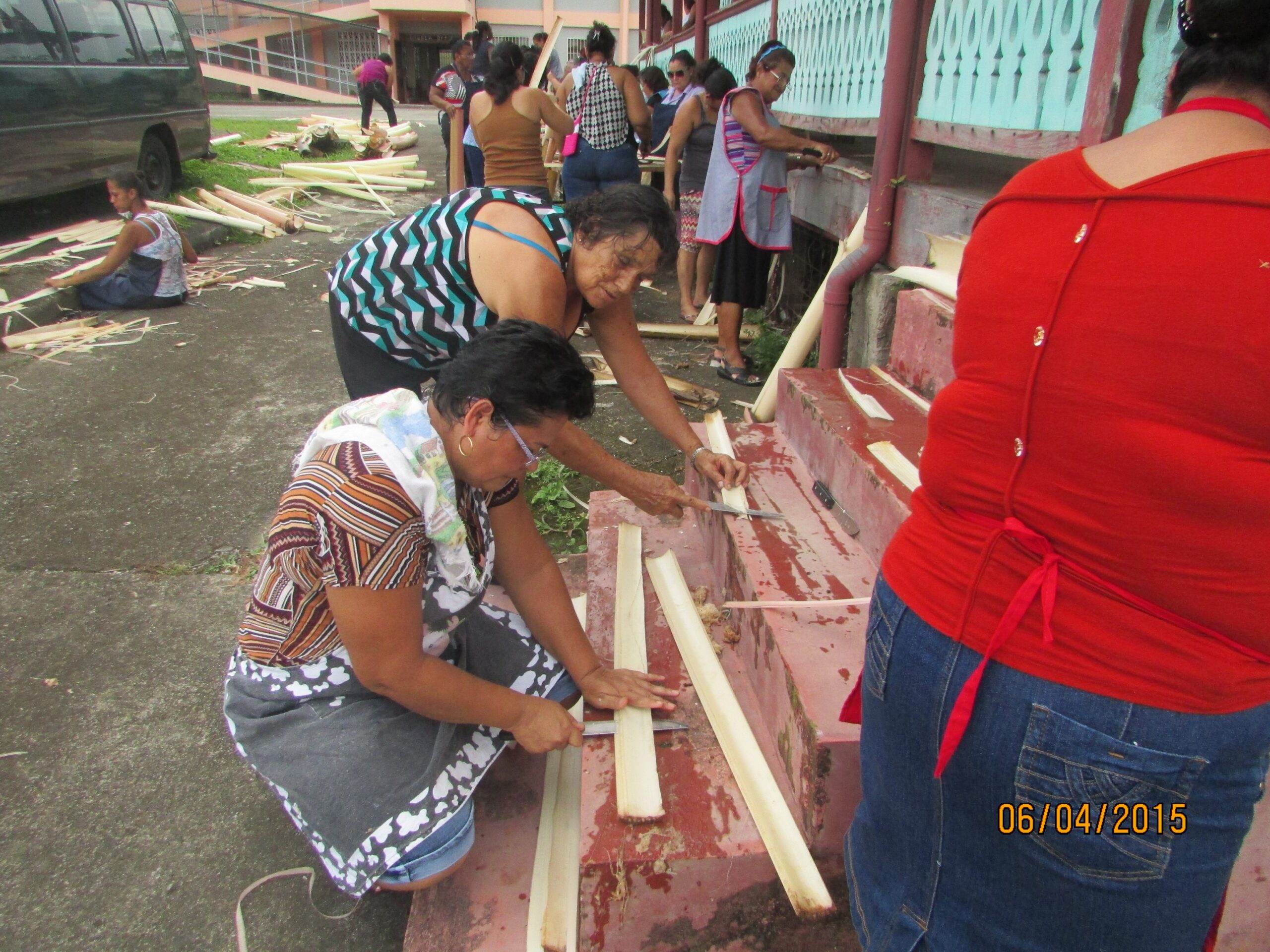

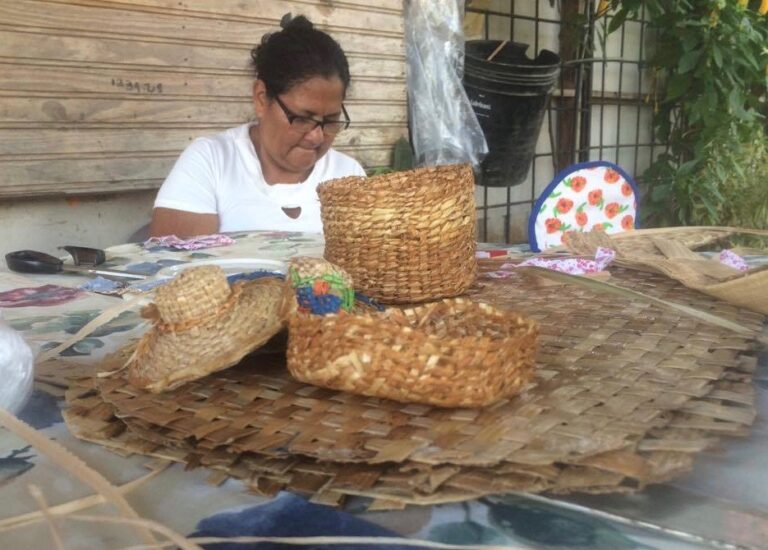
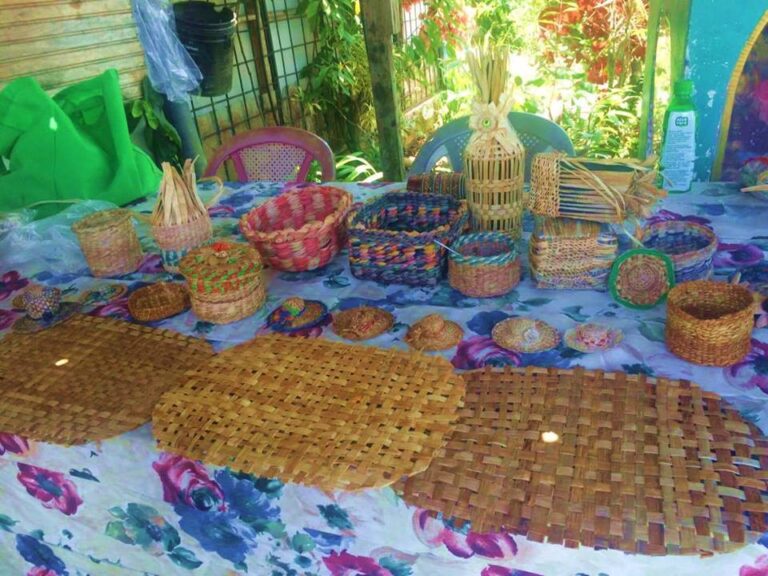
Until now, little has been done to innovate around banana waste in the rural areas of Costa Rica and Guatemala. The raw material for these crafts, banana pseudostem, are acquired at no cost, and the ease of drying and processing means products can be made comfortably from home. These crafts rely on nothing but human capital: new skills, leadership and creativity, and indeed, the women are constantly innovating to create new products.
With this project, a group of rural Costa Rican women were able form a sustainable agribusiness, and will now be able to train other rural women to do the same, generating new job opportunities and decreasing CO2 emissions by adding value to an unused waste product. Costa Rica and Guatemala both have banana plantations. By using banana fiber for the production of handicrafts, we can provide employment to rural women.”
– SINDY PATRICIA RAMOS POCÓN, EARTH UNIVERSITY PRIZEWINNER, 2016
 Sindy, who is a MasterCard Foundation Scholar, now plans to expand Handicrafts Kalöm, by replicating the training process with rural, low-income Guatemalan women who live near plantain plantations in Escuintala.
Sindy, who is a MasterCard Foundation Scholar, now plans to expand Handicrafts Kalöm, by replicating the training process with rural, low-income Guatemalan women who live near plantain plantations in Escuintala.
“Thanks to the prize, I will be able to sponsor Costa Rican trainees to begin training Guatemalan women in the skills they learned from Ecuadorian artisans. My dream is to be an example of a brand with a social and environmental approach, that also has global reach,” she said.
Kalöm has also become an approved vendor through the “Handmade” section of Amazon.com, which has the potential to significantly expand sales for their products.
“I am happy and proud. I’ve realized nothing is impossible if you have the motivation and initiative. I have struggled to be where I am today and I feel as if life has rewarded me. This project has really opened a lot of doors for me,” said Sindy.
“Implementation of Model Adaptations for a Sustainable Urban Home in Heredia, Costa Rica”
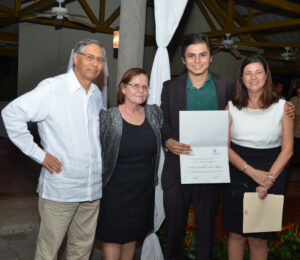 The objective of this study was to design and implement a “sustainable home” in the urban area of Heredia, Costa Rica that would serve as a reference for others to implement sustainable measures in their own homes. The project utilized an unproductive space of 143 m2 outside a family home, as well as the family’s interdisciplinary skills and potential. Waste management and recycling possibilities were investigated, with organic waste being used for compost and vermiculture production. Recycled material was used to create structures for a periurban garden of herbs, small vegetables, and hydroponic lettuce. Recycled material was also used to create and install a rainfall collection system based on historic precipitation data. The cultural perceptions of the project were also investigated as part of the study through the preparation of three surveys: one for potential customers of the vegetables produced, one for neighbors who had participated in a talk about the project, and one for students at a nearby university. The surveys revealed excitement about the project and pointed to its potential expansion.
The objective of this study was to design and implement a “sustainable home” in the urban area of Heredia, Costa Rica that would serve as a reference for others to implement sustainable measures in their own homes. The project utilized an unproductive space of 143 m2 outside a family home, as well as the family’s interdisciplinary skills and potential. Waste management and recycling possibilities were investigated, with organic waste being used for compost and vermiculture production. Recycled material was used to create structures for a periurban garden of herbs, small vegetables, and hydroponic lettuce. Recycled material was also used to create and install a rainfall collection system based on historic precipitation data. The cultural perceptions of the project were also investigated as part of the study through the preparation of three surveys: one for potential customers of the vegetables produced, one for neighbors who had participated in a talk about the project, and one for students at a nearby university. The surveys revealed excitement about the project and pointed to its potential expansion.
After the project was completed, a detailed economic analysis was conducted. The analysis found that if the families provide the labor themselves, and do not contract to third parties, the “sustainable home” could become profitable over the course of one to two years. In fact, a family could potentially add an amount commensurate with the average annual Costa Rican salary to their yearly earnings.
Another important concept that was introduced in this economic analysis was the concept of solidarity. The project involved many local people, including children, who wanted to participate in the process or learn more. Others were eager to become consumers of the sustainable home’s products. Though difficult to quantify, these social externalities were very important to the assessment of the project as a whole, as they represent an unpredictable “multiplier effect” in the project’s potential as well as incalculable market value in terms of education, motivation, and inspiration.
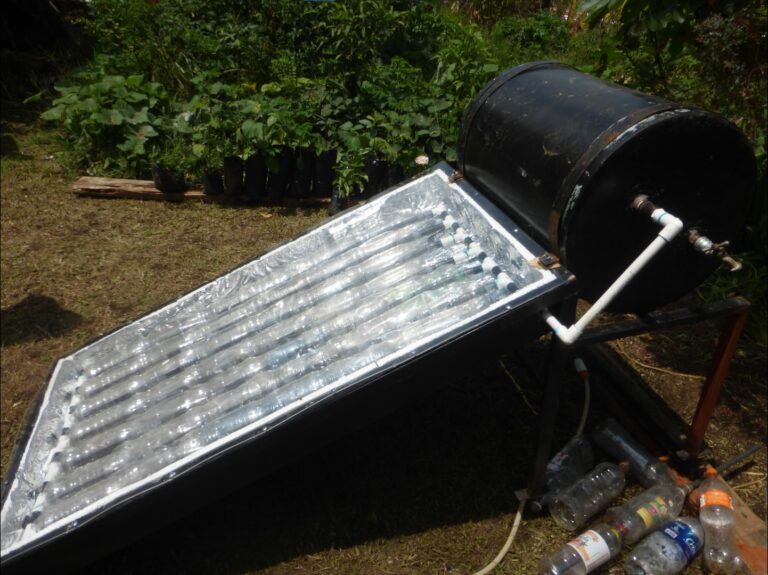




“Every month the project generated 8.5% of an average Costa Rican base salary, so over the course of the year it would generate 102%. That’s an extra salary per year, which for a low-income family would represent a big windfall. It also adds ecological value to your field. My family has reported seeing more lizards, more spiders, more birds. We even see bees pollinizing different plants. It creates ecological synergy, and if you share space with your neighbors then you have economic synergy, too. Biological assets make the endeavor more interesting from an economic point of view because of their capability to reproduce.”
– ANTONY CASTRO RIVERA, EARTH UNIVERSITY PRIZEWINNER, 2014
Antony plans to double his hydroponic agricultural operation, and to use his earnings to create a prototype for “hydroponic kits” featuring gravity-based drip irrigation systems. He intends to create a sharable resource for this prototype, including tutorials on creation and installation, so that others around the world can take advantage of his research. He is also working on a project at EARTH University that collects and makes use of soldier fly waste for compost and animal feed purposes.
Antony’s main objective for the future is to study quantum physics.
“Elaboration of a Portfolio of Projects for the Implementation of Integrated Farms in the Community of Verdetica”
The Integrated Farm model, a “whole systems approach” to agriculture, is a viable alternative to traditional farming to maximize resources while protecting nature. It is also a potent development tool for rural communities, helping families generate employment and achieve food security.
The main objective of this graduation project was to develop a portfolio of projects based on the model of an Integrated Farm in the community of Verdetica in Roxana of Pococcí. The prizewinner created programs in clean energy, agriculture, human development, water harvesting and sustainability and provided a work plan, training and consultancy for participating families. The social element of the project, in which community members were able to meet, speak with one another, and work through dissent in a productive fashion, was a key element in its realization, guiding effective project selection and planning.
As a result of the project, the community improved their interpersonal relationships with one another, overcame limitations as a group and adopted environmentally sustainable practices as a means to improving their quality of life. The community is currently beginning to implement the work plan that they developed together with the prizewinner.


María currently works with SIPAS, an environmental services company in Peru, where she handles auditing and certification for good agricultural practices and safety standards. She is also working independently on a project that echoes her graduation project, bringing in new technologies for sustainable agriculture to support a collective of farmers and rural people in her hometown of Puerto Maldonado, Peru.

“Plantain Crop with Advanced Technologies in Association with Coffee for Small Producers in Vereda San Ciro”
 With increasing production costs, and decreasing yields due to climate change, coffee production in Colombia is on the decline. In 2011, Colombia was unable to meet the demands of international markets and prices dropped. The crisis caused unemployment and major loss of revenue for small farmers. Medium and small producers were unable to meet their debts. Diana developed this project as a way to strengthen the economy of the small producers in the area, helping them integrate a plantain crop on their coffee plantations. This would represent an important additional income, improving the quality of life of the families.
With increasing production costs, and decreasing yields due to climate change, coffee production in Colombia is on the decline. In 2011, Colombia was unable to meet the demands of international markets and prices dropped. The crisis caused unemployment and major loss of revenue for small farmers. Medium and small producers were unable to meet their debts. Diana developed this project as a way to strengthen the economy of the small producers in the area, helping them integrate a plantain crop on their coffee plantations. This would represent an important additional income, improving the quality of life of the families.
Diana conducted an investigation in the village of San Ciro, Oporapa Municipality, Huila Department, Colombia, to establish a system linking small-scale coffee and plantain producers. Using the Rural Invest methodology, Diana performed a diagnostic study in the community, surveying 60 farmers on the social, economic and productive conditions of the farming families in the community.

Through literature review and using identified coffee-plantain experiences, Diana identified the plantain clones best suited for this partnership. She also determined how to improve the coffee quality, while enhancing the biodiversity of the area. Using the information collected, Diana designed a coffee-plantain production system to help move the farmers away from a monoculture farming model, while improving the quality of the coffee and the monthly income of the farmers. Ultimately, two production systems were designed. The first was a coffee-plantain association with three-year pruning cycles (see Fig.1), and the second was a banana-coffee association every five rows, helping to generate another source of income for the producer, improving their own quality of life and the quality of life in their community in general.
“Many small coffee growers in my community have implemented this plan, and are benefiting from harvesting plantains when coffee growing season is over. They are role models for other community farmers.”
– DIANA MILENA CAJIBIOY ARTUNDUAGA, EARTH UNIVERSITY PRIZEWINNER, 2012
Diana graduated in 2012 and immediately started working for the municipal mayor’s office in her hometown of Opórapa-Huila, Colombia. She is the head of the public services office and was also appointed as the promoter of a community action group (JAC). She works with the office of community development in the capital, Huila, and the 25 community leaders who serve as presidents of the JAC. She also collaborates with the municipality on solving environmental problems such as contamination of water sources, contamination due to inadequate waste management, and deforestation.
“Self Sufficiency Program for the Technical Professional High School in Los Chiles, Alajuela, Costa Rica”
This project, conducted with students, teachers and parents of the Technical Professional High School in Los Chiles, Alajuela along with representatives from EARTH University, is a guide to achieving and strengthening self-sufficiency programs in technical high schools and other educational centers.
The project dealt with five different production areas: poultry, cattle, swine, periurban gardens, and orange groves. The prizewinners evaluated available inventory of each production area in order to develop a sustainable management plan. A financial study for each area analyzed actual and projected expenses and incomes. The result was a proposal for a self-sufficiency program capable of supplying, to a great extent, the products required by the school. The work stimulated the leadership and organizational skills of the teachers, who were important for the success of the project.
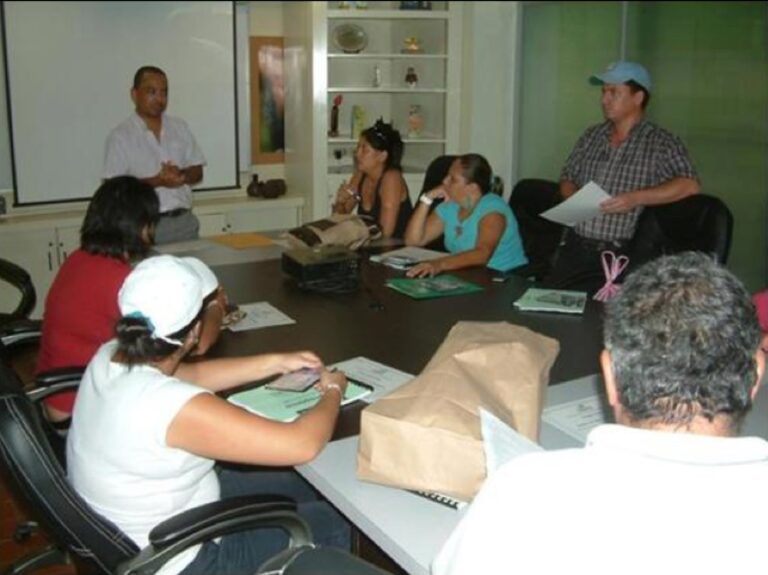


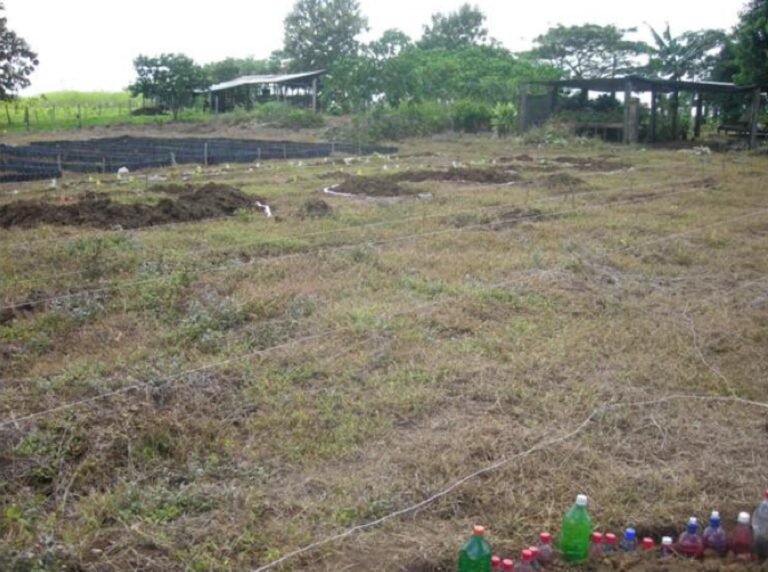
This project has made a positive impact at the Los Chiles High School as well as in the Los Chiles community. Based on the prizewinners’ report, the teachers and students have implemented the plans in the areas of composting, swine and cattle production, hens for egg production, periurban vegetable gardens, and orange groves. The only module that is still in the planning stage is the production of dairy products.
The teachers have more access to farm facilities where they can conduct practical lessons and the students are receiving classes in the outdoor classrooms. The school has received the Ecological Blue Flag recognition for their waste management, rational use of resources and sustainable development of the farm.
“Because of the prize money, we were able to finance a waste management project in the high school I attended, introducing ideas that are new to many areas in Perú. Seeing a change in the quality of life in the place that I live is the best motivation to keep going!”
– YNGRID ESPINOZA VILLARUEL, SUSTAINABILITY PRIZEWINNER, 2011
After receiving her agricultural engineering degree, Kenia realized one of her dreams: studying for a graduate degree. She used part of the money from the Sustainability Prize to pursue a Master’s degree in Management and Development of Human Resources at the Business School in Madrid, Spain (EUDE). She finished the program in April of 2013 and in September of that same year, she began working for the AgroLíbano Group in Honduras. This innovative and sustainable company is the largest exporter of melons in that country. Kenia is in charge of the artificial insemination laboratory for queen bees. She works in the pollination of the melon and extraction of honey from the hives. The department has 25 apiaries with 120 hives.
 Since graduation, Yngrid has worked for the Association for the Conservation of the Amazon Basin (ACCA) in Peru. The mission of the NGO is to protect biodiversity in the Manu National Park. She now works as the coordinator of the Agricultural Research Program, a program which she initiated. Through this program, the team looks for alternative management practices to lessen the burden on the use of the forests. The association receives interns and professors from EARTH, as well as from other institutions, to help develop new research projects.
Since graduation, Yngrid has worked for the Association for the Conservation of the Amazon Basin (ACCA) in Peru. The mission of the NGO is to protect biodiversity in the Manu National Park. She now works as the coordinator of the Agricultural Research Program, a program which she initiated. Through this program, the team looks for alternative management practices to lessen the burden on the use of the forests. The association receives interns and professors from EARTH, as well as from other institutions, to help develop new research projects.
“Processing and Commercialization Alternatives for Root and Tuber Crops in the South Atlantic Autonomous Region of Nicaragua”
 This project was conducted in the city of Bluefields in the South Atlantic Autonomous Region of Nicaragua, and evaluated various alternatives for processing cassava, malanga and quequisque, utilizing the technologies and principles of sustainable production and analyzing marketing potential for the Bluefields market. It was a nonexperimental research project that focused on the Kukra River, Kukra Hill and Zompopera communities, analyzing the economic viability and social and environmental impacts of the project. The root and tuber vegetables were processed, fried, and vacuum-packed, then offered to a test market.
This project was conducted in the city of Bluefields in the South Atlantic Autonomous Region of Nicaragua, and evaluated various alternatives for processing cassava, malanga and quequisque, utilizing the technologies and principles of sustainable production and analyzing marketing potential for the Bluefields market. It was a nonexperimental research project that focused on the Kukra River, Kukra Hill and Zompopera communities, analyzing the economic viability and social and environmental impacts of the project. The root and tuber vegetables were processed, fried, and vacuum-packed, then offered to a test market.
 The study gauged potential demand, estimating that it could generate 11 direct jobs and that 28 producers would benefit from the purchase of raw material. According to the projected income statement, revenues were estimated at $40,000 in the first year of operation, with a net present value of $163,000 in a five-year period. The social impact for communities was estimated at $4,000 per year, which could be devoted to social work. The report also specified a path towards “greening” production with respect to emissions, as part of the company’s environmental responsibility.
The study gauged potential demand, estimating that it could generate 11 direct jobs and that 28 producers would benefit from the purchase of raw material. According to the projected income statement, revenues were estimated at $40,000 in the first year of operation, with a net present value of $163,000 in a five-year period. The social impact for communities was estimated at $4,000 per year, which could be devoted to social work. The report also specified a path towards “greening” production with respect to emissions, as part of the company’s environmental responsibility.
This project has helped these rural communities realize the opportunity to add value to the agricultural products that small farmers already produce. Through their discussions with Neida, the producers have begun forming cooperatives aimed at developing new markets for their products, and a sustainable development plan for their community.
 After graduation, Neida started working as a municipal delegate for the Ministry of Agriculture and Forestry (MAGFOR) in Nicaragua. Her primary role was to work with the ministry in supporting the agricultural sector of the country. She is currently working as an environmental technician at BICU University in Nicaragua. Her work includes the adaption of local agricultural production systems to the effects of climate change.
After graduation, Neida started working as a municipal delegate for the Ministry of Agriculture and Forestry (MAGFOR) in Nicaragua. Her primary role was to work with the ministry in supporting the agricultural sector of the country. She is currently working as an environmental technician at BICU University in Nicaragua. Her work includes the adaption of local agricultural production systems to the effects of climate change.
“Biodigestion as a Strategy in the Sustainable Management of Organic Wastes and to Promote Alliances between Agro-Industry, Communities, and Networks of Ecological Schools”
 Based on Buckminster Fuller’s Design Science model, this project integrated applied research to promote alliances and environmental awareness around the transformation of agro-industrial organic wastes into energy and commercial fertilizers. The prizewinners conducted a 10-week experiment using low-cost A-type biodigestors operated in “batch” mode. All four treatments contained ripe banana peel mixed with water and swine manure. Two treatments contained biofilms grown on discarded plastic bottles, while two contained vinasse. The four treatments were analyzed for the quality and quantity of fertilizer and energy production. With all treatments, the prizewinners anticipated that 0.9 Mg of CO2 per year could be reduced—a 12% to 20% increase over normal levels—and that the biodigestors could be used to generate 2 610 kWh/year.
Based on Buckminster Fuller’s Design Science model, this project integrated applied research to promote alliances and environmental awareness around the transformation of agro-industrial organic wastes into energy and commercial fertilizers. The prizewinners conducted a 10-week experiment using low-cost A-type biodigestors operated in “batch” mode. All four treatments contained ripe banana peel mixed with water and swine manure. Two treatments contained biofilms grown on discarded plastic bottles, while two contained vinasse. The four treatments were analyzed for the quality and quantity of fertilizer and energy production. With all treatments, the prizewinners anticipated that 0.9 Mg of CO2 per year could be reduced—a 12% to 20% increase over normal levels—and that the biodigestors could be used to generate 2 610 kWh/year.
The prizewinners made these results available to the agribusiness sector to encourage entrepreneurial alliances among rural communities impacted by organic waste. They organized a seminar where they featured biodigestion as an integrated approach in the sustainable management of agro-industrial wastes. Working in collaboration with the Ministry of Public Education and the Ministry of the Environment within selected communities, prizewinners were able to promote awareness of the waste situation among 100 children in an ecological school network. This network helped the children gain a better understanding of the impact of adequate waste management on health, the environment and community well being. Additionally, the children learned about strengthening “social capital” by using affordable technologies for recycling to stimulate economical returns and foster ecological equilibrium.
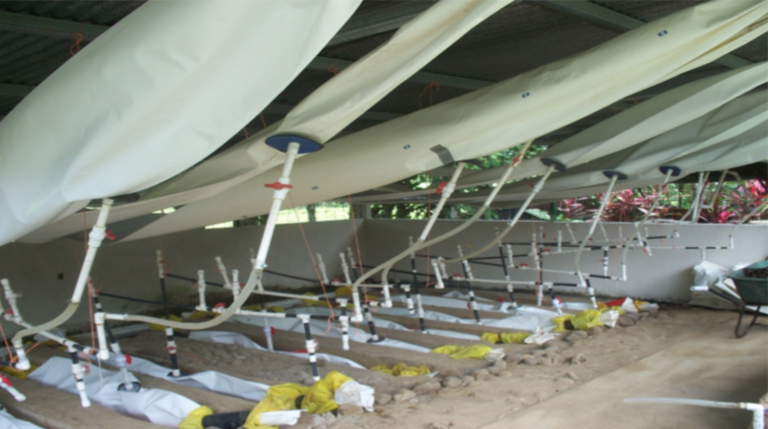



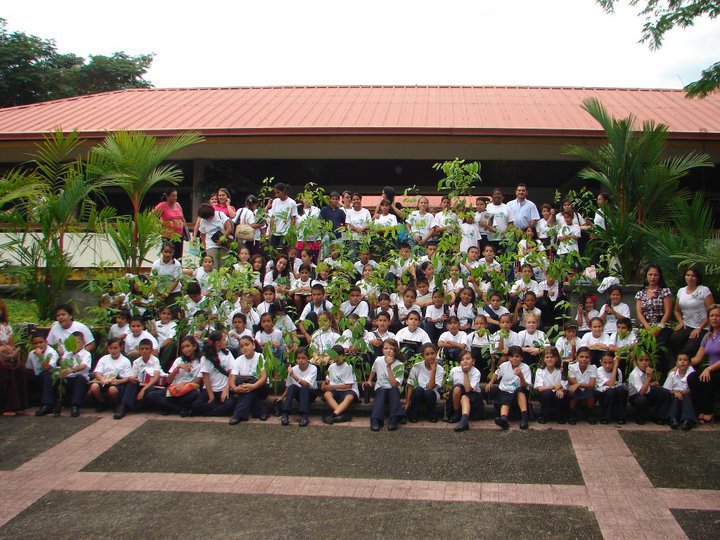
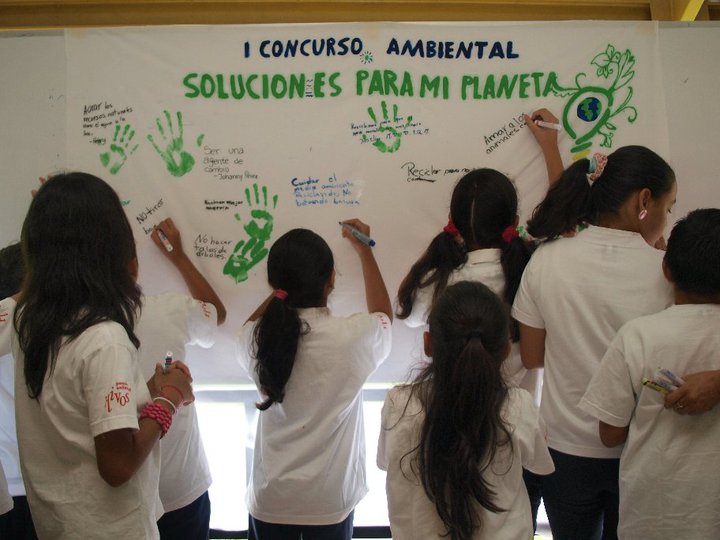
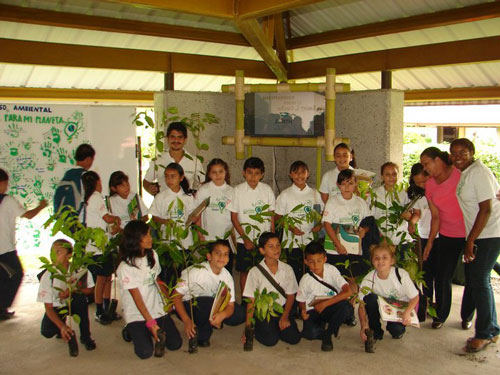

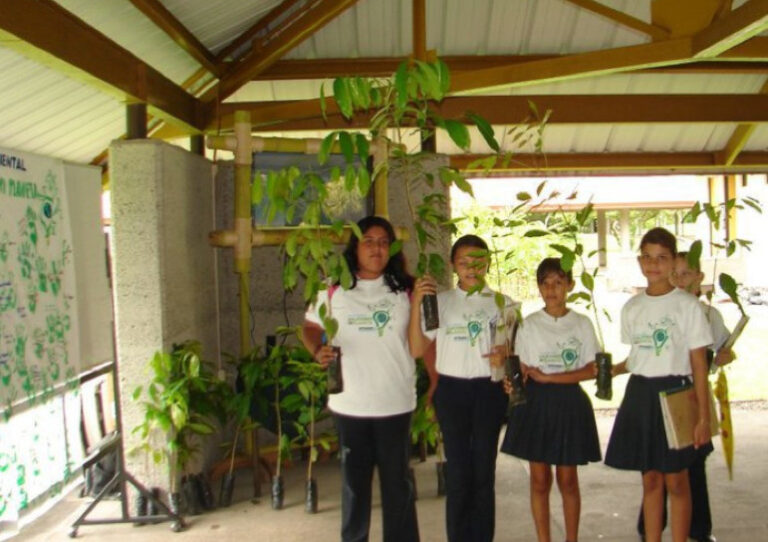
This project has had a multiplier effect in the communities close to the university. The children and their teachers benefited from the workshops and have continued them independently since the prizewinners’ graduation.
The local producers and EARTH students who participated in the workshop held on campus were able to implement the biodigestor technologies on their farms. The participants have been working with other producers to continue their education about these technologies.
 In September 2011, Johanny received an International Postgraduate Studies scholarship from the German Federal Ministry of Education and Research to pursue a Master’s degree in Water Technologies at Stuttgart University in Germany. Her thesis topic is “biofiltration for odors and VOCs emissions control in African and Caribbean countries.” During her studies, she did an internship at the Fraunhofer Institute for Interfacial Engineering and Biotechnology (IGB), investigating the analysis of technologies for the reutilization of potassium rich liquid effluents after K-struvite precipitation for agricultural purposes.
In September 2011, Johanny received an International Postgraduate Studies scholarship from the German Federal Ministry of Education and Research to pursue a Master’s degree in Water Technologies at Stuttgart University in Germany. Her thesis topic is “biofiltration for odors and VOCs emissions control in African and Caribbean countries.” During her studies, she did an internship at the Fraunhofer Institute for Interfacial Engineering and Biotechnology (IGB), investigating the analysis of technologies for the reutilization of potassium rich liquid effluents after K-struvite precipitation for agricultural purposes.
 In March of 2013, Tania began working at HEMCO Nicaragua, a mining company located in the municipality of Bonanza, as the environmental operations manager. Her activities include management of hazardous and non-hazardous wastes, promotion of strategies for environmental education for primary and secondary school children, and coordinating the establishment of forest plantations for the conservation of water and wildlife.
In March of 2013, Tania began working at HEMCO Nicaragua, a mining company located in the municipality of Bonanza, as the environmental operations manager. Her activities include management of hazardous and non-hazardous wastes, promotion of strategies for environmental education for primary and secondary school children, and coordinating the establishment of forest plantations for the conservation of water and wildlife.
“Strengthening a Network of Communities for Cooperative Sustainable Management of Solid Wastes”
 This initiative focused on integrating communities in Pococí county, Costa Rica, into a network where community members could come together to find appropriate methods for solid waste management and environmental protection. This project was conducted in conjunction with EARTH University, MINAET (Ministry of Environment, Energy, and Telecommunications), and 25 active members from the communities, through meetings, workshops, and other complementary activities. Since the students’ graduation, MINAET has continued the project independently.
This initiative focused on integrating communities in Pococí county, Costa Rica, into a network where community members could come together to find appropriate methods for solid waste management and environmental protection. This project was conducted in conjunction with EARTH University, MINAET (Ministry of Environment, Energy, and Telecommunications), and 25 active members from the communities, through meetings, workshops, and other complementary activities. Since the students’ graduation, MINAET has continued the project independently.
 In two of the aforementioned workshops, the main actors developed new ideas and techniques to extend the useful life of inorganic solid waste and generate new potential uses for the substances. A third workshop reinforced the concepts of organization and leadership through theoretical and practical approaches. One of the final results of the project was the projection of this community network at the national level with the crowning of the “Ecological Queen,” which was an eco-awareness themed pageant filmed for national TV.
In two of the aforementioned workshops, the main actors developed new ideas and techniques to extend the useful life of inorganic solid waste and generate new potential uses for the substances. A third workshop reinforced the concepts of organization and leadership through theoretical and practical approaches. One of the final results of the project was the projection of this community network at the national level with the crowning of the “Ecological Queen,” which was an eco-awareness themed pageant filmed for national TV.
 The work in organization and community leadership strengthened the communities’ social capital, which was important for the successful implementation of the project. One of the main impacts of the project was the development of a replicable model for community organization, which can be applied to resolve any issue of concern in rural communities.
The work in organization and community leadership strengthened the communities’ social capital, which was important for the successful implementation of the project. One of the main impacts of the project was the development of a replicable model for community organization, which can be applied to resolve any issue of concern in rural communities.
This project has had a lasting impact on the women’s groups of each community. They have developed individual small businesses centered around the recycling of plastic and paper waste materials. Supported by an $1,000 contribution from the prizewinners, the communities have also continued the annual Eco-Queen Pageant.
The project has helped to unite these communities and promote the exchange of information between the women owners of small businesses. These women, and these communities, are leading the way in developing a culture of dealing appropriately with the wastes they produce. They have become role models for other communities in Costa Rica’s Atlantic Zone.
“The prize and its impact was evident: more love and harmony with nature, greater environmental knowledge and awareness of solid waste management, and more support for others to care for and preserve our natural resources. In my community, it has taught many people about waste management and they appreciate very much the ongoing project they have in the school where I was a high school student. They continue to carry out the waste management project with students of all ages.”
KEYLIN SOTO, SUSTAINABILITY PRIZEWINNER 2009
Since her graduation in 2009, Valodia has focused her work on developing proposals for sustainable projects. In 2010, she worked with two other EARTH graduates on a project proposal for the Municipal and Industrial Technological Park in Pococí county. The project was designed for the sustainable management of solid wastes. The project, which also served as her thesis topic for her M.Sc. in Sustainable Development and Environmental Management, was accepted by the government in March of 2011. In December of 2012, she was hired as Coordinator of Agricultural Investigation by the sugarcane processing company Ingenio Monte Rosa S.A. Her five areas of emphasis are fertilization, pests, soil management, water use, and crop production.
After graduation, Keylin started working for a transnational company in central Costa Rica, providing technical advice to producers about field use of agrochemicals. Her involvement with the company also afforded her the opportunity to work in the areas of soil and water conservation as well as in integrated waste management. She worked with the company until 2011, when she left to care for her two children.